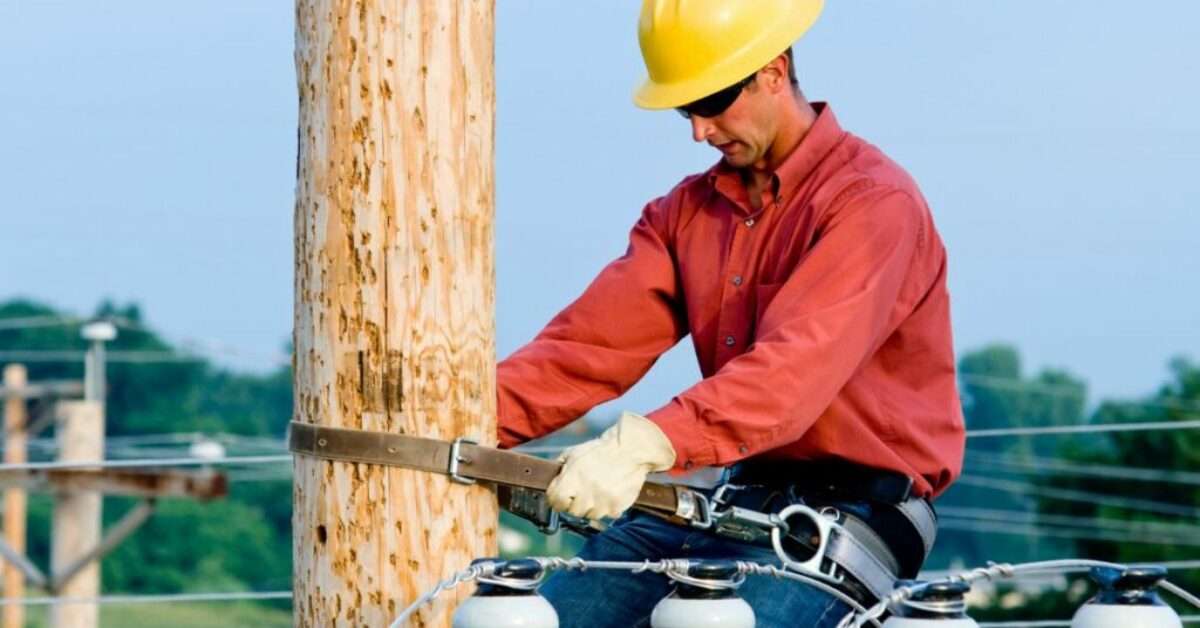How To Become A Lineman?
If you are looking for a challenging and rewarding career, becoming a lineman may be the perfect match. Linemen are responsible for maintaining, installing, and repairing power lines, which plays a crucial role in providing electricity to homes and businesses. In this article, we will explore the steps, skills, and benefits of becoming a lineman.
Steps To Becoming A Lineman
Becoming a lineman requires a combination of education, training, and on-the-job experience. Here are the steps to take to become a lineman:
- Earn A High School Diploma Or Equivalent
The first step to becoming a lineman is to get a high school diploma or equivalent. While in high school, you can also consider taking courses in math, science, and electronics that can help you prepare for a career as a lineman. These courses will give you a solid foundation in the fundamental concepts of electricity, which is crucial for a lineman.
Additionally, you can participate in extracurricular activities that can help you develop the physical strength and endurance required for the job. For example, you can join a sports team or a fitness club to build your stamina and agility. - Complete A Lineman Training Program
After completing high school, you can enroll in a lineman training program at a community college or technical school. These programs will equip you with the essential skills and knowledge needed to install, maintain, and repair electrical power lines. You will learn about electrical theory, safety practices, and equipment handling. For more information on accredited lineman training programs, visit the North American Lineman Training Center (NALTC) or the National Center for Construction Education and Research (NCCER).
The training program will also provide you with hands-on experience, where you will work with equipment and tools used by linemen. You will learn how to climb poles, use bucket trucks, and operate power tools safely and efficiently. - Gain On-The-Job Experience
After completing the lineman training program, you can seek an apprenticeship or entry-level position to gain on-the-job experience. During this time, you will work alongside experienced linemen and learn additional skills, such as pole climbing, equipment installation, and troubleshooting. You can explore apprenticeship opportunities at the National Joint Apprenticeship and Training Committee for the Electrical Industry (NJATC) or through the U.S. Department of Labor’s Apprenticeship Program.
You will also learn how to work in different weather conditions, such as extreme heat, cold, and rain. You will learn how to work safely in hazardous environments, such as near high-voltage power lines and transformers. - Obtain Lineman Certification
After completing your apprenticeship or gaining enough work experience, you can obtain lineman certification. This certification shows that you have met the industry standards, and you possess the necessary skills to perform the job.
The certification process involves passing a written and practical exam that tests your knowledge and skills in various areas, such as electrical theory, safety practices, and equipment handling. Once you obtain the certification, you can work as a lineman for a utility company or a contractor.
Becoming a lineman is a challenging but rewarding career. It requires a combination of physical strength, technical knowledge, and safety awareness. By following these steps, you can become a skilled and certified lineman and make a valuable contribution to the electrical industry.
Skills Needed For Becoming A Lineman
While formal education and training are essential to becoming a lineman, several skills are required for success in this profession. Here are some of the critical skills needed to become a lineman:
Physical Fitness
Linemen have to work in extreme weather conditions and at high altitudes. Therefore, they must have the physical strength and stamina to perform their duties effectively.
Physical fitness is crucial for linemen to perform their duties safely and efficiently. They need to climb poles, work on power lines, and carry heavy equipment. Linemen must also be able to work in extreme weather conditions, such as during storms or in high temperatures.
Linemen need to maintain their physical fitness through regular exercise and a healthy diet. They may also need to undergo regular physical exams to ensure that they are fit for duty. The National Strength and Conditioning Association (NSCA) provides resources on strength training and conditioning that can help prepare you for the physical demands of the lineman profession.
Problem-Solving Skills
Linemen are responsible for solving complex electrical problems. Effective problem-solving skills are essential for identifying and addressing electrical issues safely and efficiently.
Problem-solving skills are essential for linemen to diagnose and repair electrical problems. They need to be able to analyze complex electrical systems and identify issues quickly. Linemen must also be able to come up with creative solutions to problems that may arise.
Linemen may need to work with other professionals, such as engineers and electricians, to solve complex electrical problems. Effective communication and collaboration are essential for successful problem-solving.
Good Communication Skills
Linemen work in a team environment, and communication is vital to ensure that everyone is aware of the task at hand and safety protocols.
Good communication skills are essential for linemen to work effectively in a team environment. They need to be able to communicate with their colleagues and supervisors to ensure that everyone is on the same page. Linemen must also be able to communicate effectively with customers, explaining the work that needs to be done and answering any questions they may have.
Effective communication is also crucial for ensuring safety on the job. Linemen need to be able to communicate any potential hazards and ensure that everyone is following safety protocols.
Attention To Detail
Linemen must have exceptional attention to detail to ensure that every task is done correctly. Even the smallest mistake can be dangerous and costly in this industry.
Attention to detail is essential for linemen to ensure that every task is done correctly. They need to be able to follow complex electrical diagrams and ensure that all connections are made correctly. Linemen must also be able to identify potential hazards and ensure that all safety protocols are followed.
Linemen may need to work in hazardous environments, such as high altitudes or near live electrical wires. Attention to detail is essential to ensure that they can perform their duties safely and efficiently.
Becoming a lineman requires not only formal education and training but also several critical skills. Physical fitness, problem-solving skills, good communication skills, and attention to detail are all essential for success in this profession.
What is A Lineman?
A lineman, also known as a powerline technician, is a skilled tradesperson who installs, maintains, and repairs electrical power lines. They are responsible for ensuring that electrical power is transmitted safely and efficiently from power plants to homes, businesses, and other facilities.
Linemen work in a variety of settings, including urban and rural areas, and are often required to travel long distances to reach remote locations. They work in all kinds of weather conditions, from blistering heat to freezing cold, and are always on call to respond to emergencies.
One of the most important aspects of a lineman’s job is safety. Because they work with high-voltage electricity, linemen must follow strict safety protocols to protect themselves and others from electrical shock and other hazards. They wear specialized equipment, such as rubber gloves and sleeves, to insulate themselves from electrical current, and they use a variety of tools and techniques to ensure that power lines are de-energized before they begin work.
Linemen typically work in teams, with each member performing a specific role. For example, one lineman might climb a power pole to perform repairs, while another lineman on the ground operates equipment and communicates with the lineman on the pole. This teamwork is essential for ensuring that work is performed safely and efficiently.
In addition to their technical skills, linemen must also have excellent problem-solving and critical thinking abilities. They must be able to quickly diagnose and repair problems with power lines, often under challenging conditions. They must also be able to work well under pressure, as power outages can have serious consequences for communities and businesses.
Overall, linemen play a vital role in ensuring that our homes, businesses, and communities have access to reliable electrical power. Their hard work and dedication keep the lights on and the power flowing, even in the toughest of conditions.
The Benefits of Working as A Lineman
Besides the pride that comes with providing essential utilities to households and businesses, there are several other benefits to working as a lineman. These include:
High Earning Potential
Linemen have a high earning potential due to the specialized skills they possess. According to the Bureau of Labor Statistics, the average yearly salary in the United States was around $85,420 as of May 2023.
But it’s not just about the money. Linemen are highly skilled professionals who are respected in their communities. They work hard to ensure that homes and businesses have access to electricity, which is essential for modern life.
Job Security
There is a high demand for linemen in the utility industry due to the growth of the population and the need to modernize electrical power infrastructures, which guarantees job security. This means that linemen can enjoy stable employment and a reliable income throughout their careers.
Moreover, linemen are trained to work in all kinds of weather conditions, from scorching heat to freezing cold. This means that they can work year-round, which is another factor that contributes to their job security.
Career Advancement Opportunities
Linemen can advance to supervisory or management positions within their organizations. They can also become electrical engineers or project managers. This means that linemen have the opportunity to grow and develop their careers over time.
Furthermore, linemen are often part of a larger team that includes engineers, project managers, and other professionals. This means that they have the opportunity to collaborate with others and learn new skills, which can also contribute to their career advancement.
Travel Opportunities
Linemen can work in different regions and even countries, which presents them with travel opportunities. This means that linemen can experience new cultures and environments while doing their jobs.
Moreover, linemen often work in remote or rural areas, which can be an adventure in itself. They may have to travel by helicopter or boat to reach their work sites, which can be exciting and challenging.
Pride in Their Work
Linemen take pride in the fact that their work is essential in ensuring that homes and businesses have access to electricity. The satisfaction of doing a job well done is unmatched.
Moreover, linemen are often called upon to work in emergency situations, such as after a natural disaster. In these situations, linemen are heroes who work tirelessly to restore power to affected communities. This sense of purpose and meaning is another reason why linemen take pride in their work.
Becoming a lineman requires dedication, physical and mental stamina, and specialized training. However, the rewards can be well worth the effort. If you have the required skills and passion for this challenging profession, consider taking the steps to become a lineman and enjoy the benefits of a rewarding career for many years to come.
Whether you’re looking for high earning potential, job security, career advancement opportunities, travel opportunities, or simply the satisfaction of doing a job well done, working as a lineman can provide all of these benefits and more. So why not explore this exciting and rewarding profession today?




